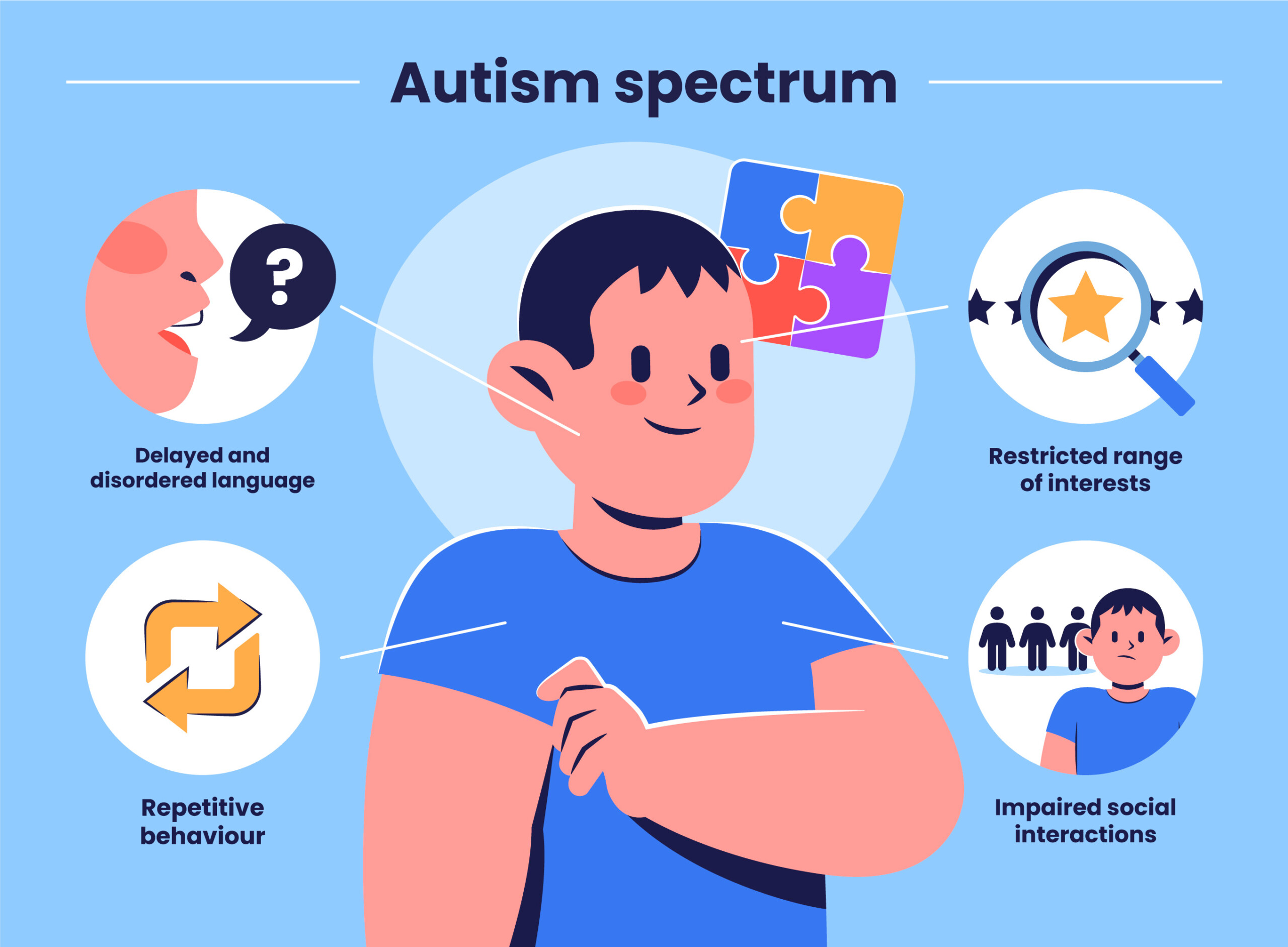Key Indicators and Symptoms to Identify in People With Behavior Autism
When you come across a person with behavioral autism, identifying key symptoms and signs is essential. You might notice obstacles in social communications and interaction, as well as a strong requirement for routines. Additionally, sensory sensitivities can cause frustrating experiences. Comprehending these qualities can improve your support and interventions, but there's even more to reveal concerning exactly how these habits materialize in everyday situations. Allow's discover what these indications really look like.
Challenges in Social Communications
When you connect with a person on the autism spectrum, you could see they battle with social cues and communication. These obstacles can make social communications feel frustrating for them.
Furthermore, you might find that they favor routines and acquainted setups, which can limit their willingness to participate in new social scenarios. They might speak about their passions in wonderful information without discovering if you're interested when they do involve. This can cause one-sided conversations that leave you really feeling disconnected. Recognizing these challenges can help you approach communications with compassion and patience, fostering a much more comfy setting for both of you.
Trouble With Verbal and Non-Verbal Interaction

Recognizing these indications is important, as it helps you better support and involve with individuals on the autism spectrum. By recognizing their communication obstacles, you can cultivate much more meaningful links and offer an extra helpful environment.
Repeated Behaviors and Regimens
Communication obstacles typically come with various other indications of autism, such as recurring behaviors and a solid choice for routines. You might observe that individuals with autism usually participate in details, repeated activities, like hand-flapping, shaking, or repeating expressions. These behaviors can supply convenience and a sense of control in an usually overwhelming globe.
Regimens are equally essential; several individuals prosper when they follow a structured routine. You may discover that adjustments to these routines can bring about significant distress. For example, if they have a day-to-day ritual of eating morning meal at a specific time or complying with a specific route to institution, any disturbance can trigger stress and anxiety.
Identifying these patterns helps you comprehend their actions and offer assistance. By suiting their need for regular and allowing repetitive activities, you can produce a much more comfortable environment that relieves their challenges.
Sensory Sensitivities

Usual Sensory Triggers
Sensory sensitivities can substantially impact everyday life for people with autism, as certain stimuli frequently cause overwhelming responses. Common sensory triggers include loud sounds, intense lights, and solid smells. You may discover that unexpected sounds, like alarm systems or alarms, cause stress and anxiety or distress. Fluorescent lighting in stores can really feel extreme and awkward. Textures can also play a significant role; harsh textiles or particular food appearances might be unbearable for you. Furthermore, crowded locations can overwhelm your senses, making it hard to focus or kick back. Comprehending these triggers can aid you manage your setting much better. By recognizing what affects you, you can take actions to reduce pain and enhance your everyday experiences.
Behavioral Responses Explained
Recognizing your behavior responses to sensory sensitivities is essential, as they frequently expose exactly how you engage with the world. You may additionally discover on your own looking for specific sensory experiences, like deep stress or quiet settings, to aid ground on your own. Identifying these patterns assists you comprehend your needs far better and can direct how you communicate them to others.
Coping Strategies Overview
Acknowledging your sensory sensitivities is simply the first step; now it's time to explore coping strategies that can assist you handle those experiences successfully. Begin by producing a sensory toolkit customized to your demands. Developing an organized routine can also offer predictability, lowering anxiousness around sensory overload.
Restricted Interests and Focus
While several people create a vast array of rate of interests, those with autism often demonstrate limited interests and an intense concentrate on certain topics. You could notice that someone with autism can spend hours delving into their preferred topic, whether it's a particular type of train, a certain motion picture, or a clinical concept. This extreme focus isn't just a hobby; it can become a central part of their identity and social interactions.
You might find that conversations rotate around these rate of interests, and they may battle to involve in wider topics. By recognizing and recognizing these restricted interests, you can foster a supportive setting where they really feel valued and comprehended, allowing for even more significant links and interactions.
Emotional Policy Problems
People with autism frequently face check here obstacles in psychological law, which can be affected by their extreme focus on certain passions. You may notice that when an individual is deeply involved in a favored task, they can experience solid emotions, whether excitement or frustration. This strength occasionally makes it hard for them to shift gears or manage their sensations when points don't go as planned.

Irregularity in Developmental Milestones
When it comes to developmental milestones, you'll see that individuals with autism frequently reveal a broad range of irregularity. You might see a kid stand out in language abilities however battle with social interactions.
It's vital to identify that each individual's trip is distinct. Some might develop complicated skills early, only to encounter challenges later. Others might take longer to accomplish standard turning points yet then grow in particular locations. Observing these patterns can assist you recognize their strengths and needs much better.
Frequently Asked Concerns
Just How Is Autism Detected in Children and Adults?
To detect autism in kids and grownups, specialists evaluate habits, interaction skills, and social interactions. If a private meets the standards for autism spectrum condition., website they commonly use standardized examinations, interviews, and monitorings to establish.
Are There Different Kinds Of Autism Spectrum Disorders?
Yes, there are different types of autism spectrum disorders, including Asperger's disorder and prevalent developing disorder-not or else specified. Each type varies in severity and characteristics, so comprehending these distinctions can help you far better assistance people with autism.
What Therapies Are Effective for Individuals With Autism?
When taking into consideration reliable treatments for individuals with autism, you'll find alternatives like Applied Actions Analysis, speech therapy, and occupational treatment. Each technique can assist enhance communication, social abilities, and everyday functioning tailored to individual demands.
Can People With Autism Lead Independent Lives?
Yes, people with autism can lead independent lives. With the ideal assistance, abilities training, and resources, you can help them create self-sufficiency, take care of everyday tasks, and thrive in various environments, cultivating their self-reliance.
Just How Can Households Support Enjoyed Ones With Autism?
You can sustain your liked ones with autism by developing an organized environment, urging their interests, exercising persistence, fostering interaction, and promoting social abilities. Celebrate their success, no matter how tiny, and construct an encouraging neighborhood.
Although many individuals on the autism range can understand and use language, they usually face significant difficulties with both spoken and non-verbal interaction. Acknowledging these indications click here is vital, as it helps you better assistance and involve with people on the autism range. You could discover that individuals with autism typically involve in details, repeated actions, like hand-flapping, rocking, or repeating expressions.Sensory level of sensitivities can significantly impact everyday life for individuals with autism, as certain stimuli frequently set off overwhelming reactions.When it comes to developing turning points, you'll observe that people with autism often show a wide array of variability.
Comments on “Top 10 points about how an Autism Therapist's intervention supports social growth in autism”